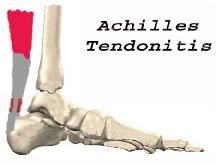Achilles Heel
Achilles tendonitis or tendonosis is referred to as a tendonopathy as it is a painful and debilitating swelling of the Achilles tendon, also called the achilles heel. The Achilles tendon is the largest and strongest tendon in the body and is located in the back of the lower leg, attaching to the heel bone (calcaneus), and connects the leg muscles to the foot. The Achilles tendon gives us the ability to rise up on our toes, during the act of walking, and Achilles tendonitis can make walking almost impossible. But it is also the most frequently ruptured tendon, and both professional and weekend athletes can suffer from Achilles tendonitis, a common overuse injury and swelling of the tendon.
The achilles tendon do not have true inflammation but a watery type of swelling upon injury and therefore does not usually respond well to anti-inflammatory medication.
Any number of events may trigger an attack of Achilles tendonitis, including:
- rapidly increasing your running mileage or speed,
- adding hill running to your training routine, starting up too quickly after a layoff.
- Injury caused by sudden and/or hard contraction of the calf muscles when putting out extra effort such as in a final sprint or tennis.
Symptoms of Achilles Tendonitis:-
- Mild pain after exercise or running that gradually worsens
- Episodes of diffuse or localized pain, sometimes severe, along the tendon during or a few hours after running with some swelling
- Morning tenderness or stiffness about an inch and a half above the point where the Achilles tendon is attached to the heel bone which generally diminishes as the tendon warms up with use.
Because several conditions such as a partial tendon tear and heel bursitis have similar symptoms, you need to see your osteopath for a proper diagnosis.
Osteopathic Treatment depends on the degree of injury to the tendon, but usually involves
- Rest, which may mean a total withdrawal from running or exercise for a week or more, or simply switching to another exercise, such as swimming, that does not stress the Achilles tendon
- Orthotics, which are devices to help support the muscle and relieve stress on the tendon such as a heel pad or shoe insert
- Stretching, massage, ultrasound or laser and appropriate exercises to strengthen the weak muscle group in front of the leg and the upward foot flexors
Things that may prevent this injury:-
- Choose your sports shoes carefully. They should provide sufficient cushion for the heel strike. Using a prescribed orthotic to change the position of a poorly aligned heel bone may also help. Perhaps the best precaution is to know your limits and to follow a sensible program when you exercise.
- Walk and stretch to warm up gradually before running. It’s better to spend few minutes warming up than to spend months on the sidelines with a ruptured Achilles tendon.
- Focus on stretching and strengthening the muscles in the calf. Walk briskly for 10 minutes before you start to run, and if you are over 40 try to avoid running first thing in the morning.
- Increase your running distance and your speed gradually, in increments no greater than 5% a week.
- Cool down properly after exercise.
APTA recommends LLLT for Achilles Tendinopathies
June 18, 2010
American Physical Therapy Association (APTA) Clinical Guidelines recommend Low Level Laser Therapy (LLLT) for Achilles tendinopathies. The report says “Clinicians should consider the use of low level laser therapy to decrease pain and stiffness in patients with Achilles tendinopathy.”
Martin Davies Osteopaths regularly use laser therapy on soft tissue injuries and have had particular success with Achilles Tendinopathies.
Please contact us for more information.

